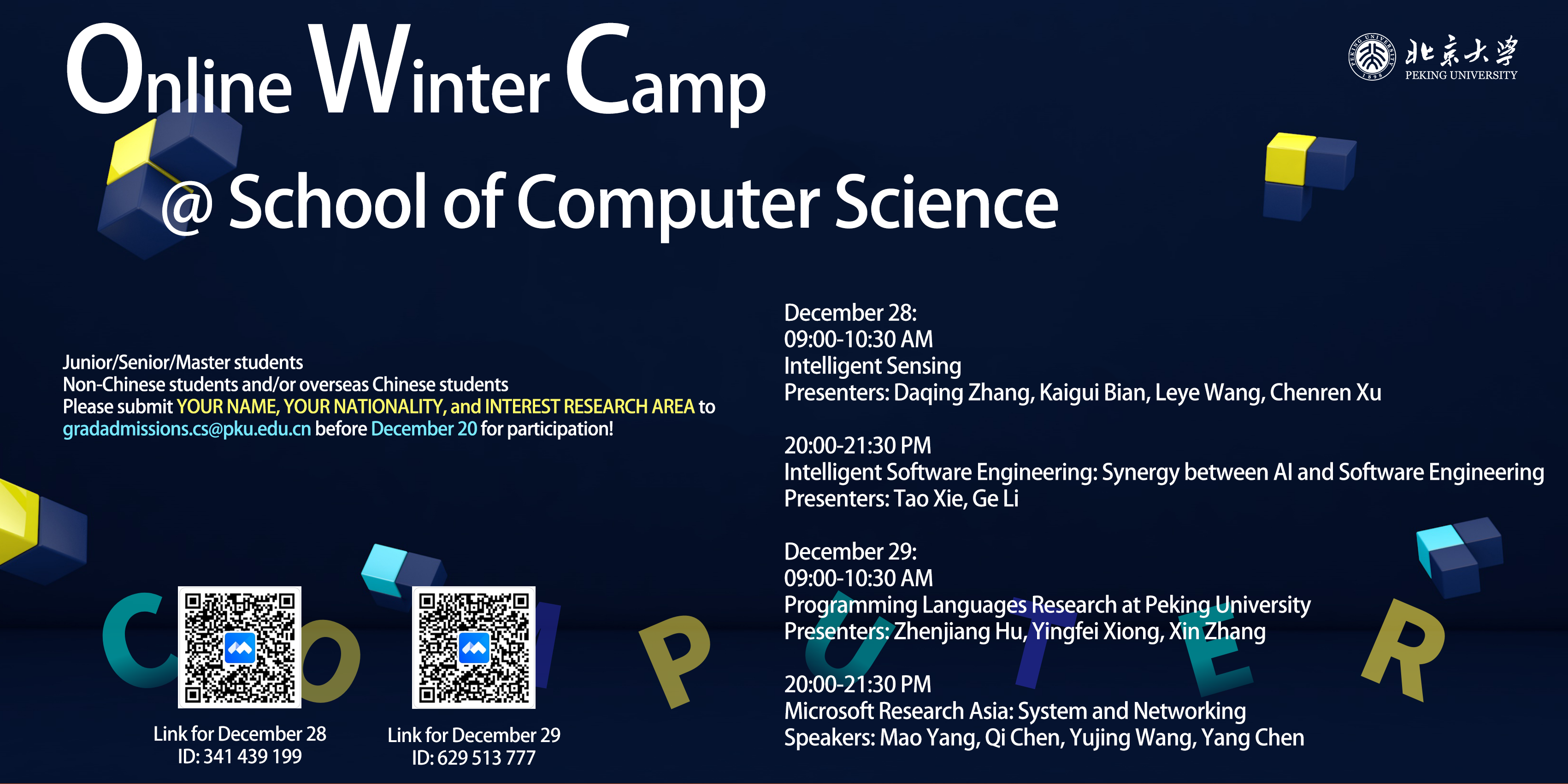Through the 2-day winter camp, you will be able to:
1. Understand the cutting-edge research of School of Computer Science;
2. Understand the development of technology industry in China
After learning more about the School of Computer Science, we hope that you will consider our Master and/or PhD Program in the near future. The application deadline for degree program is on February 28, 2022!

**LAST CALL**
If you are:
Junior/Senior/Master students
Non-Chinese students and/or overseas Chinese students
Please submit YOUR NAME, YOUR NATIONALITY, and INTEREST RESEARCH AREA to gradadmissions.cs@pku.edu.cn for participation!
Beijing Time: December 28-29
09:00-10:30 AM
20:00-21:30 PM
December 28: 9:00-10:30 AM & 20:00-21:30 PM
Title: Intelligent Sensing
Presenters: Daqing Zhang, Kaigui Bian, Leye Wang, Chenren Xu
Abstract: With the prevalence of ubiquitous sensing sources such as smartphones, cameras, and WiFi, we can obtain a rich set of digital signals that can intelligently monitor and analyze our daily life. While with a great potential, ubiquitous intelligent sensing technologies still face a variety of fundamental challenges like sensing generalizability, energy consumption, privacy protection, etc. In this session, we would introduce our recent research achievements in intelligent sensing, including wireless sensing with ubiquitous RF signals, inertial and visual sensing, backscatter networking for battery-free sensing, and privacy-preserving mobile crowd sensing.
Title:Intelligent Software Engineering: Synergy between AI and Software Engineering
Presenters: Tao Xie, Ge Li
Abstract: As an example of exploiting the synergy between AI and software engineering, the field of intelligent software engineering has emerged with various advances in recent years. Such field broadly addresses issues on intelligent [software engineering] and [intelligence software] engineering. The former, intelligent [software engineering], i.e., AI4SE, focuses on instilling intelligence in approaches developed to address various software engineering tasks to accomplish high effectiveness and efficiency. The latter, [intelligence software] engineering, i.e., SE4AI, focuses on addressing various software engineering tasks for intelligence software, e.g., AI software. This talk will discuss recent research and future directions in the field of intelligent software engineering.
December 29: 9:00-10:30 AM & 20:00-21:30 PM
Title: Programming Languages Research at Peking University
Presenters: Zhenjiang Hu, Yingfei Xiong, Xin Zhang
Abstract: The Programming Languages research at Peking University aims at building the next-generation programming languages, including their fundamental theories and core infrastructures. Towards this goal, we have proposed the concept of bidirectional transformation and led its research, which formed a new sub-field in programming languages; we have started the new direction of program analysis by combining logic and probabilities, which leads a new paradigm of analyzing programs; we have proposed a data-driven framework for program synthesis and repair, which doubles the precision of program repair and consequently solves the key bottleneck preventing industry adoption. Based on these results, we are developing new techniques for building the next-generation programming languages and their infrastructures, such as: 1. how to efficiently develop domain-specific languages, 2. how to synthesize complex algorithms, and 3. how to build reliable artificial intelligence.
Company Talk: Systems and AI Research at Microsoft Research Asia
Speakers: Mao Yang, Qi Chen, Yujing Wang, Yang Chen
Abstract: This session consists of three talks that exemplify the wide range of research conducted in the systems and networking research area of Microsoft Research Asia. The talks cover topics from Web search system to time-series intelligence system to blockchain. Qi will introduce SPANN, an efficient memory-disk hybrid indexing and search system, which enables highly efficient approximate nearest neighbor search (ANNS) at a large scale. It has been deployed into Microsoft Bing to support hundreds of billions scale vector search. Yujing will present cutting-edge technologies to achieve time-series intelligence, including multivariate time-series anomaly detection, multivariate time-series forecasting, and time-series representation learning. She will also touch how the new intelligence powers the Microsoft Azure AI platform and enhances DevOps. Yang will talk about Forerunner, a novel constraint-based speculative execution approach with an application to the Ethereum blockchain. This approach is intellectually intriguing because it is the first many-future speculative execution technique, which generalizes how pre-executions can be leveraged to accelerate the actual execution.
** Link for December 28: https://meeting.tencent.com/dm/4aREJar7CIFF
ID: 341 439 199

** Link for December 29: https://meeting.tencent.com/dm/ZjbO7GBfKkEI
ID: 629 513 777




